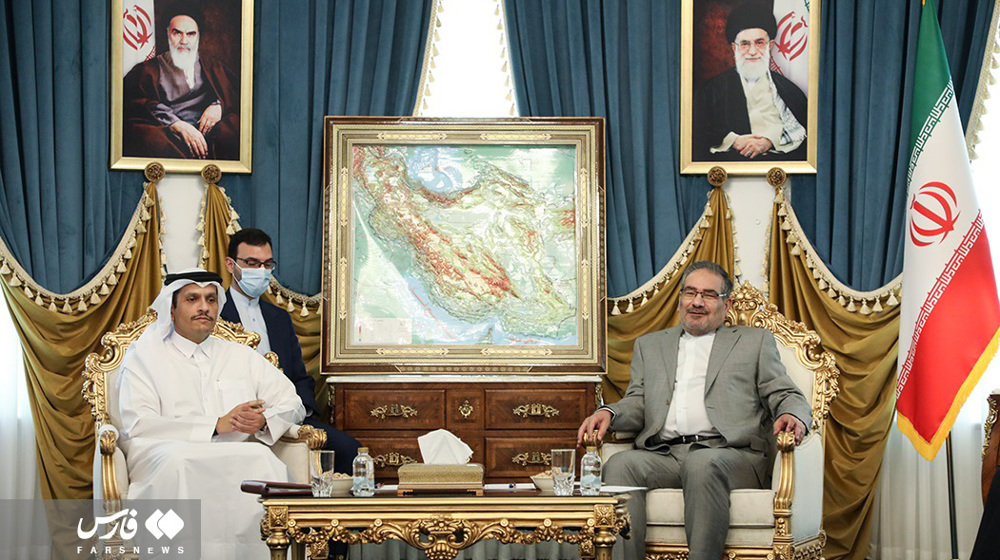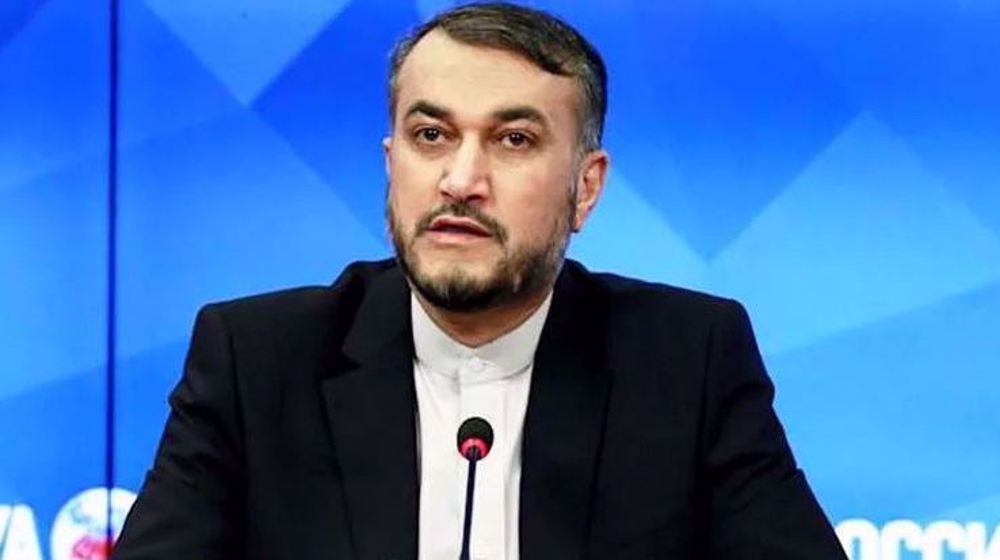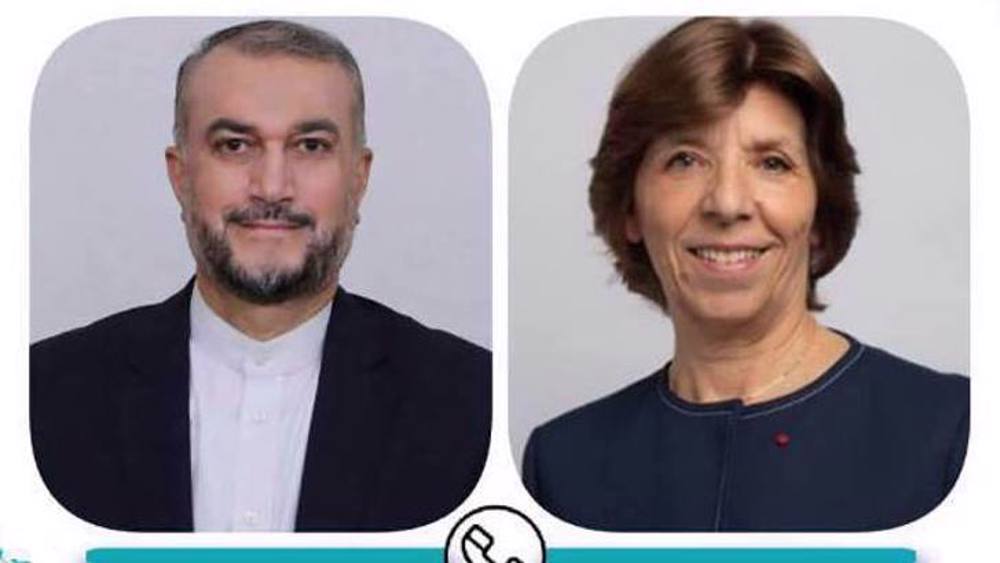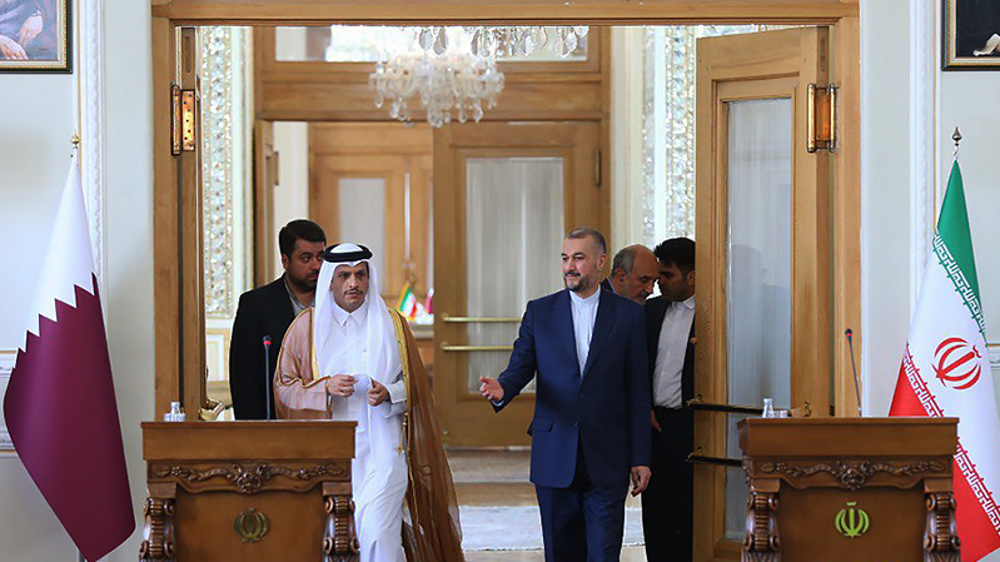Any alliance with Israel threatens regional stability, security: Shamkhani
Iran's top security official, Ali Shamkhani, says any alliance with the Israeli regime, even of a non-security and non-military nature, will pose serious threat to the stability and security of the Middle East region.
Shamkhani, Secretary of Iran's Supreme National Security Council (SNSC), made the remarks in a meeting with visiting Qatari Deputy Prime Minister and Minister of Foreign Affairs Sheikh Mohammed bin Abdulrahman Al Thani in Tehran on Wednesday.
He underlined the emphasis on neighboring countries in the Islamic Republic's foreign policy, asserting that Tehran’s coherent policy towards its neighbors is to expand all-out and strategic relations on the principle of good neighborliness.
Iran's top security official went on to describe terrorism and Zionism as the two main sources of insecurity in the region, saying any alliance with the Zionist regime, even of a non-security and no-military nature, will "threaten the stability and security of the region".
Shamkhani said Iran's behavior in the region shows it has always been interested in collective security and respect for the territorial integrity of other countries.
He pointed to Tehran’s strong condemnation of Kuwait invasion and occupation in August 1990 by Iraqi dictator Saddam Hussein, and Iran’s support for Qatar in the face of a Saudi-led economic and diplomatic embargo against the energy-rich Persian Gulf country as clear examples of such a strategy.
Elsewhere in his remarks, Shamkhani referred to the negotiations over the revival of the 2015 nuclear deal, officially known as the Joint Comprehensive Plan of Action (JCPOA), stressing that Iran's approach is to reach a strong, lasting and reliable agreement in the talks.
“Oppressive sanctions against Iran should be removed in such a way that all countries could easily invest in the country while maintaining their long-term interests,” the top security official said.
He noted that Iran entered the new round of negotiations in Doha with the aim of reaching an agreement, and will adhere to diplomacy as it did in the past in order to fully restore its legal rights.
Shamkhani wished Qatar success in hosting the 2022 FIFA World Cup, and once again voiced Iran’s readiness to offer cooperation in this regard.
The Qatari foreign minister, for his part, underlined the need for regional dialogue and negotiations to overcome man-made barriers and advance bilateral and multilateral relations.
He pointed to Qatar's firm support for talks on removal of anti-Iran sanctions, saying, all parties should "honor the commitments enshrined in the JCPOA and return to the agreement as soon as possible.”
The European Union was tasked with coordinating indirect negotiations between Iran and the United States during the fresh round of negotiations in Qatar last week.
The talks were held just a few days after European Union foreign policy chief, Josep Borrell, visited Tehran seeking to break the impasse.
Iran has refused to hold direct talks with Washington as it is no longer a party to the landmark deal, which was unilaterally abandoned by former US president Donald Trump in May 2018.
The talks in Doha followed seven rounds of inconclusive negotiations in the Austrian capital of Vienna since April last year.
After quitting the agreement, Trump restored sanctions on Iran as part of what he called the “maximum pressure” campaign against the country.
The sanctions and the policy remains in place despite Biden administration repeatedly acknowledging that the policy has been a total failure.
Iran has maintained it wants guarantees that it will be able to enjoy the economic benefits that were promised in the original deal.
Negotiations reached an impasse and were suspended in March over Washington’s refusal to remove post-JCPOA sanctions and take Iran’s Islamic Revolution Guards Corps (IRGC) off the list of “foreign terrorist organizations.”
The Trump administration blacklisted the IRGC in 2019 – the first and only time the United States has designated part of another country’s armed forces – in a move that analysts say was intended to make it harder for any future administration to re-enter the deal.
VIDEO | Australians rally for Gaza ahead of Christmas festivities
VIDEO | Attacks on Sana'a
Iran reports further drop in annual inflation rate in December
Israel indicts two settlers over suspected spying for Hezbollah
Iran: US airstrikes on Yemen war crimes, violation of international law
Yemeni armed forces down F-18 fighter jet, repel US-UK attack: Spokesman
Iran warns against US-Israeli plot to weaken Muslims, dominate region
VIDEO | Public uproar in US against Israeli regime













 This makes it easy to access the Press TV website
This makes it easy to access the Press TV website